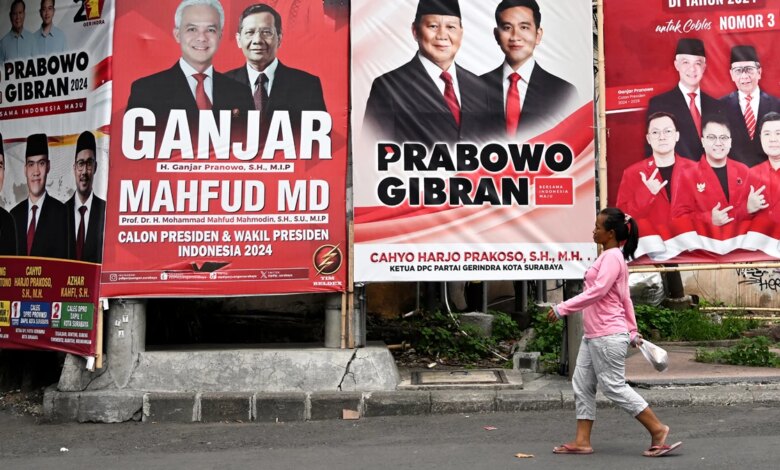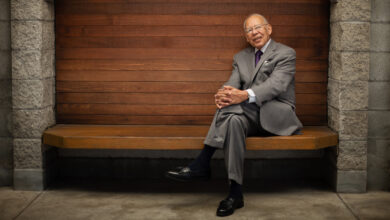Indonesian Christians Divided Over Choosing Country’s Next…… | News & Reporting

Last October, the reputation of Indonesia’s widely respected president took a fateful hit.
Led by President Joko “Jokowi” Widodo’s brother-in-law, the Constitutional Court of Indonesia dropped the age limit for presidential and vice-presidential candidates if they previously held elected regional office. Conveniently, this paved the way for Jokowi’s son, Gibran Rakabuming Raka, 36, to run as vice president for front-runner Prabowo Subianto in the February 14 presidential elections.
“That is the worst thing to happen to our democracy,” said Yonky Karman, a lecturer at Jakarta Theological Seminary. “This [upcoming] election is orchestrated by the incumbent to offer his preferred candidate, and the worst thing is that he made a way for his eldest son to run as vice president by changing the election law.”
Five years ago, 97 percent of non-Muslims voted for Jokowi. This time, Christians are divided in their support.
In the world’s third-largest democracy, Muslims make up 87 percent of the population while Christians make up 10 percent. For Christians, the most important issue when voting in an election is maintaining their rights as a minority religion. Because of this, they largely supported Jokowi in the past two elections.
Yet this time, the decision is trickier. Ex-general Prabowo is a former longtime rival of Jokowi, who later joined the president’s coalition and served as defense minister. Christians worry that, in the past two elections, he had the backing of radical Muslim groups.
Prabowo is running against Anies Baswedan and Ganjar Pranowo, both former governors. Anies is no stranger to the headlines either, after accepting support from radical Muslims who strongly opposed his rival, ethnic Chinese Christian Basuki “Ahok” Tjahaja Purnama, in the 2017 Jakarta gubernatorial election. Meanwhile, some are concerned about how much Ganjar, who has the support of moderate Muslims, will be influenced by former president Megawati Sukarnoputri.
Currently, Prabowo commands a large lead in the polls with 47 percent of the vote, compared to Ganjar at 25 percent and Anies at 21 percent, according to a December poll.
However, if none of the candidates receive more than 50 percent of the votes and wins at least 20 percent of the votes in half of Indonesia’s provinces, a second runoff election will be scheduled in June.
Respondents mentioned that, while the Christian vote is split, Jokowi’s push for “dynasty politics” is dominating conversations among Christians.
Franz Magnis-Suseno, a Jesuit priest and professor who has authored several books on political philosophy, noted that Indonesia is in a “really dangerous situation.”
“For many of us, it is the question of how will Indonesian democracy go on?” Magnis-Suseno said. “Under Jokowi, democracy is going down … the drain.”
A ‘humble, down-to-earth president’
Five years ago, it seemed unthinkable that such a popular figure like Jokowi would cause so much controversy .
“[Jokowi] was known to be very democratic and he … exhorted the plurality of culture and religion in Indonesia,” said Andrew Kristanto, pastor of an Indonesian church in New Zealand. Kristanto is one of more than 1.7 million overseas voters in the 2024 election, and while he has lived abroad for the last eight years, he said he follows Indonesian politics closely.
He described Jokowi as a “humble, down-to-earth president [whom] everyone loved.” Kristanto believed Indonesia became “a rising power in Asia, if not the world” while Jokowi was president and pointed to his achievements, such as recognition from world leaders, infrastructure growth, and the minimization of Islamic radicalism.
“He truly cares for the minority, for the lowly,” he said.
Andreas Hauw, a lecturer at Southeast Asia Bible Seminary and the founder of a political education nonprofit in Malang, Indonesia, agreed. He noted that Christians and the wider community approved of Jokowi’s performance in the last nine years.
During his administration, the government improved health care and education and standardized fuel prices in various regions, he said.
“Although there are still acts of radicalism such as the banning of churches, they occur sporadically,” said Hauw. “In general, Christians enjoy great freedom of worship.”
Jokowi catapulted into the country’s top post in the 2014 elections, which saw conservative Muslims squaring off against moderate Muslims and minority groups. Polls found that moderate Muslims and 97 percent of non-Muslim voters backed Jokowi and his running mate Ma’ruf Amin in the 2019 elections. Meanwhile, his rival Prabowo won the hearts of conservative Muslims.
To Kristanto, the decision between Prabowo and Jokowi in those two elections was “black and white.”
When asked about Jokowi’s actions at the end of his tenure, Kristanto paused before answering. “I’m a bit conflicted on this issue because, yes … I’m disappointed in how Jokowi toys with the constitution and he seems to [be using] any means to accomplish his goal,” he said.
“What Jokowi has done with the constitution leaves a bad legacy.”
Prabowo a ‘problematic’ figure
Does this mean the popular president has alienated his Christian supporters in just five years?
“Some are happy with Jokowi’s policies,” said Karman. “But people like me are concerned with the future of democracy and the future of good governance.”
He pointed to the Corruption Perceptions Index, which saw Indonesia’s score drop to the same level as the score in 2014, when Jokowi first came into power.
Others question whether they would vote for Prabowo, even if he has Jokowi’s support in this election.
“For some Christians, the figure of Prabowo is problematic, especially when you see 2014 and 2019, he was supported by radical Islamic groups,” said Kristanto. “If Prabowo really becomes president, will he still listen to Jokowi? Will Jokowi’s son be a powerful envoy?”
So far in this campaign, radical Muslim groups have stayed silent about who they will be throwing their weight behind, and Prabowo himself has tried to appear moderate, said Magnis-Suseno, who is German-born but has lived in Indonesia since the ’60s. Unlike in Prabowo’s previous campaigns, religion has not played a big role because the candidate wants the support of pro-Jokowi Indonesians, he said.
“Prabowo wants to avoid the questions of religious camps. … It would make it more difficult for him if he appeared as the champion of hard-line Muslim groups,” said Magnis-Suseno.
Moderate Muslim leaders agree that the current presidential election has focused less on voters’ religious identities. “People have even started to feel ashamed if they use issues related to ethnicity, religion, race, or intergroup relations in political campaigns because the public has become more discerning,” said Inayah Rohmaniyah, an Islamic studies scholar.
But history is not easily forgotten. In the past two elections, Muslim hard-liners like Amien Rais (co-founder of the conservative National Mandate Party) were embedded in Prabowo’s camp. In 2014, Rais viewed the election in stark terms: “the party of Allah” against “the devil’s party.”
Magnis-Suseno believes that referring to political parties in this way is “evil” in a democracy. “Prabowo accepted this, and in 2019 he also accepted support from the 212 group.”
The rally called Alumni 212 emerged during the 2016 campaign for the Jakarta gubernatorial election in opposition against Ahok. Ahok was accused of blasphemy after referring to the Quran and sentenced to two years in prison. In the wave of that backlash, Ahok lost the bid in 2017 to Anies Baswedan, who is also running for president this time around.
But Magnis-Suseno said one of the biggest threats to democracy posed by Prabowo was his allegations of “widespread cheating” after Jokowi declared victory in the last election. Mass protests against Jokowi’s win turned violent and left eight people dead and hundreds injured. Prabowo was also a military leader during the May 1998 riots leading up to former leader Suharto’s downfall, during which 1,200 people burned to death and more than 90 ethnic Chinese women were raped.
“I do not believe in his democratic convictions at all,” Magnis-Suseno said of Prabowo. “I am afraid that democracy will be in big danger if he becomes president.”
Similarly, Martin Lukito Sinaga, founder of the Society of Interreligious Dialogue and a lecturer at Jakarta Theological Seminary, suggested that because of the way the law was changed for Gibran to run in the election, if Prabowo won, Indonesia would face “a setback in democracy,” and an “autocratic government” would likely develop.
A divided Christian vote
All of this has left Indonesian Christians without an obvious choice.
Magnis-Suseno recalled an encounter with a parish priest in East Jakarta. “He told me, ‘Our churches could be built after Anies gave permission, so part of my community will vote for Anies,’” Magnis-Suseno said. “Then in his parish, [there is] a good Catholic activist who is one of the close co-workers of Prabowo; thus, many of his community will vote for Prabowo, and the rest will vote for Ganjar.”
Karman also noted that Protestants were divided as well. He said he’d be happy with either Anies or Ganjar as the country’s next president.
“Ganjar does have another positive point, which is that his vice president candidate is Mahfud MD,” Karman said. “Mahfud is a professor in law and the former head of Mahkamah Konstitusi (the Constitutional Court). He knows many things about laws and is consistently against corruption.”
Sinaga believed the church would have more of a chance to minister effectively under Ganjar’s leadership because he appeared more open to plurality. He said that Ganjar also seemed focused on addressing the gap between the rich and poor, which worsened in 2022.
On the other hand, he believed democracy would flourish under Anies but may potentially lean more toward Islamic interests because he would need the support of more hard-line Muslim groups to garner the votes needed for the presidency. “Churches may need more energy to deal with religious legislations proposed by Islamic political power,” he said.
Hauw believes most Christians would not vote for Anies because he benefited from the strong opposition to Ahok in the 2017 election.
As for Ganjar and Prabowo, Hauw is wary about who is pulling the strings behind them. Former president Sukarnoputri, who chairs the Indonesian Democratic Party of Struggle, selected Ganjar as the party’s candidate. (Jokowi also rose to power through the same party, but in recent years his relationship with Megawati had grown increasingly estranged.) On the other hand, Prabowo is seemingly controlled by Jokowi through his son as a proxy.
“My main concern in this presidential election is that there is not one qualified candidate to vote for,” he said. Looking at the top two candidates, “One side likes the puppet but not the puppeteer. On the other side, the puppeteer is liked but not the puppet. Practically speaking, Ganjar is liked but the puppeteer isn’t, while on Prabowo’s side the puppeteer is liked.”
Kristanto also raised concerns about whether Ganjar would be an independent president, as it was uncertain how much influence Megawati had on Ganjar: “That has been a concern for some people as well because they’re afraid that Ganjar and Megawati don’t really get the visions of the great Indonesia Jokowi has been imagining.”
Kristanto said he would be voting for a candidate based on whether they have been aligned with radical Muslim groups in the past, how far they have tried to distance themselves with those groups, and whether they use them for their own political popularity.
While he didn’t share who he plans to vote for next month, he noted, “I would choose the candidate with the cleanest track record in terms of how he exhorts plurality.”




